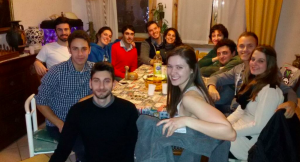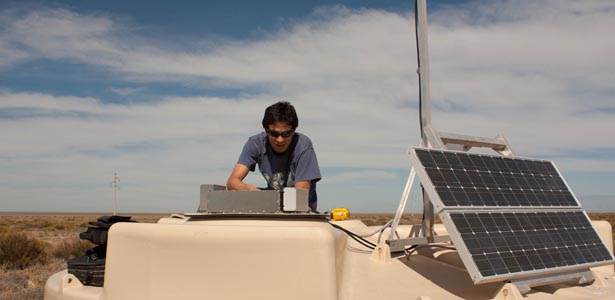
Card games on Christmas at Valentina’s house (clockwise from front center: Sara Hales, 2014-2015, Fulbright English Teaching Assistant to Italy, Alessandro Foti, Giulio Merlani, Alessandro Petricca, Valentina Petricca, Federico Fuser, Chiara Fersini, Daniele Ragni, Cristiano Petrini, Riccardo delle Monache, Cristina Cecchetti I spent Christmas Eve and Day with one of my teachers, Orietta
I’ve been putting off writing this post because I don’t really know where to begin in describing my Italian Christmas experience. Throughout December, I anxiously anticipated my first Christmas away from my family with a mixture of excitement and dread. The holiday itself here in Viterbo, Italy, where I am working as a Fulbright English Teaching Assistant (ETA), was likewise a mixture of the familiar and the new. As I walked through the bancarelle downtown, I got to see, smell, and participate in the charming European tradition of the Christmas market. But even this became a reminder of the commercialism of Christmas that many in the United States have tried to move away from. Italy is not immune from the commercialization of Christmas, and many that I’ve met here have expressed disdain for the market booths filled with useless trinkets. I was quite pleased, however, to discover a box of Christmas decorations in my apartment, so in true American fashion, I put them up the day after Thanksgiving.
A few days later, a friend came over and was surprised to see my decorations already displayed. Locals decorate for Christmas on the Feast of the Immaculate Conception on December 8. So I had jumped the gun, but this was luckily rectified by my adopted family who invited me over to have lunch and help them decorate their home on December 8.
As a Fulbright ETA, a good amount of my education on Italian holiday traditions happened while working at school and doing Christmas lessons with my students. My students at the Istituto Tecnico in Viterbo are all around 16 years old, and over the last few months, we’ve had both difficult and wonderful moments as we work toward understanding each other’s English better (students here learn British English, so sometimes my American accent throws them off!). As I shared my family’s and community’s holiday traditions, they in turn taught me about Italian Christmas traditions. It turns out that a generation ago, Santa Claus, or Babbo Natale, did not exist in Italy! There was only the Befana, a good witch who came during the night before Epiphany (January 6) to stuff stockings full of candy and toys for good children, and coal and ashes for bad children. Globalization has made its mark in Viterbo, though, because today Italian children have both Babbo Natale and the Befana. Lucky kids. To my American understanding, the Befana sounded exactly like our version of Santa, only a female and 12 days late bringing presents. My students were baffled by the concept that the Befana doesn’t exist at all in the United States, as well as the idea that Santa does the job of both Babbo Natale and the Befana for us. I, likewise, was appalled at the concept of having to wait until the twelfth day of Christmas to receive presents – and, I’ll admit, a little jealous of my students for getting presents twice during the Christmas season.
I spent Christmas Eve and Day with one of my teachers, Orietta, and her family. They sweetly welcomed me into their home and allowed me to participate in their family celebrations and traditions. Orietta’s mother is the Italian nonna I have wanted to meet for three months. She is small and sweet, but mighty; she cooked the majority of the three large Christmas meals herself, and greeted me with a kiss as soon as we were introduced. Everyone was patient with my broken Italian and even included me in the evening gift exchange. They also taught me to play tombola, which is the traditional Christmas game and is essentially bingo raised a power or two. We all laughed together as the two-year-old grandnephew/great-grandson repeated each number called out for the entire evening, and groaned together over the agony of an almost-filled bingo card. Although I only won the equivalent of 50 cents that night (did I mention that Christmas games are betting games?), I count it as a victory that I didn’t lose anything. On Christmas night, I went to a get-together with some friends and played even more games, with the Italian 40-card deck of course, and promptly lost that hard-earned 50 cents. But it was a blast to be around friends on a day that, in the United States, is usually reserved exclusively for family.
Of course this wouldn’t be an Italian holiday blog article if I didn’t talk about the food. There was a ton of it. Meat cannot be served on the eves of church feast days, so Christmas Eve lunch is always entirely seafood. At my teacher’s house, we had an amazing pasta dal mare, followed by more clams and shrimp and eel and salmon plates. Orietta had me taste a little bit of everything for good luck. And then there was dessert! The traditional Italian dessert is called panettone. Think fruitcake, only better. It’s a sweet bread with raisins and other dried fruit cooked into it. Normally, I can take or leave the store-bought panettone, but my teacher brought homemade panettone for Christmas Eve which was incredible. Christmas Eve dinner was more fish, and more dessert than I ever thought I could eat. That fact, at least, is the same as Christmas in the United States! For Christmas Day lunch, I got to try two types of traditional Christmas lamb, as well as a pasta dish that is specifically Viterbese. It is macaroni noodles cooked with chocolate and walnuts, and is fantastic. I think one of the biggest takeaways from those Christmas meals, other than the importance of family and the traditional foods themselves, is that I need to learn how to cook from the women of Orietta’s family.
In the United States, every family has its own Christmas tradition and rituals. My family makes waffles, watches “A Charlie Brown Christmas,” and reads the Christmas Story from the Gospel of Luke on Christmas Eve after the candlelight church service. But that’s just my family. I can’t necessarily describe universal American Christmas rituals, or foods beyond peppermint-flavored everything. Probably the closest I got was teaching my students about the poem “Twas the Night before Christmas” (watch us read it here). But in Italy, there are certain things that everyone does, like eating fish on the Vigilia even if you hate it, and playing tombola even if you’re bored. This may seem like a stilted way to celebrate Christmas, but as I actually participated in these traditional games and ate these traditional foods, I realized that they are so much more than the simple actions themselves. They connect families to each other and Italians across extremely diverse regions of the country by the joy brought by this wondrous holiday. This year, they connected me to a culture and a people that I’ve been living among for three months in a much deeper way.
I am writing this piece on the Epiphany. Today also happens to be the day I returned to Viterbo after visiting a dear friend. When I arrived at my apartment, there was a bag hanging on my door with a note. The note was from the Befana (in this case my friend/”fratello” Cristiano and his family, my adopted family here in Italy) explaining her traditional role, and the bag contained a stocking full of treats from her. How wonderful it is to be surrounded by people who want to include me in their traditions and make me feel welcome? These people have been the best thing about spending the holidays in Italy as a Fulbright ETA.



No Comments